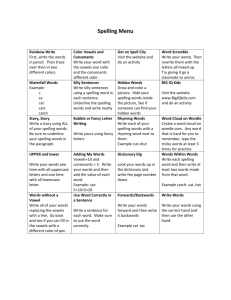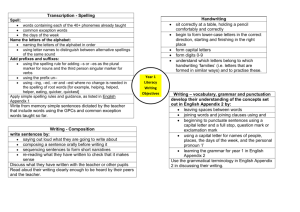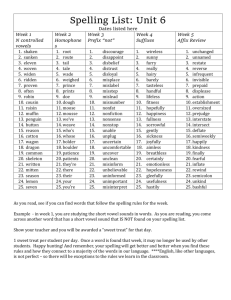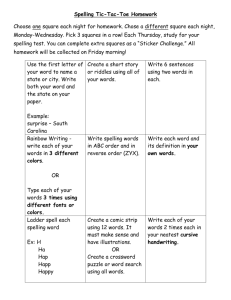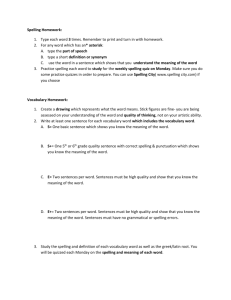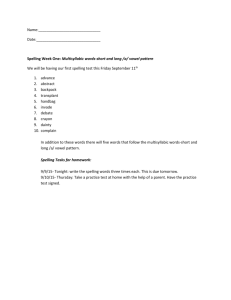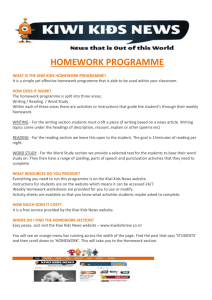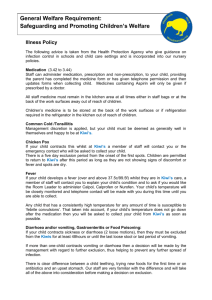Kiwi-Kids-News-Homework
advertisement
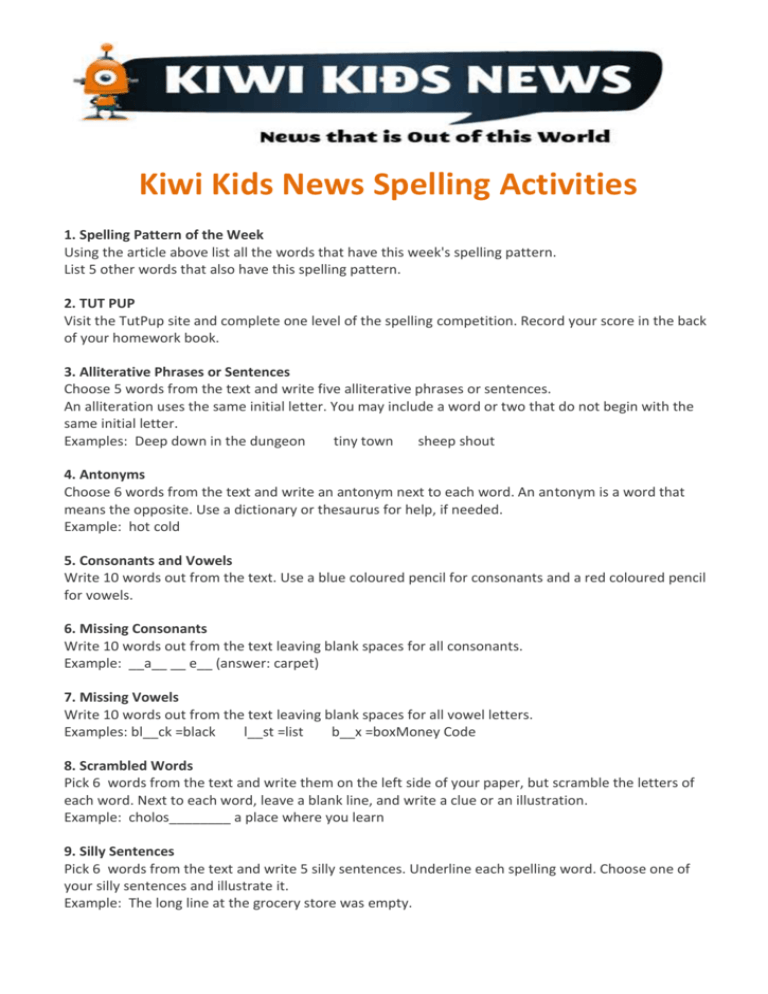
Kiwi Kids News Spelling Activities 1. Spelling Pattern of the Week Using the article above list all the words that have this week's spelling pattern. List 5 other words that also have this spelling pattern. 2. TUT PUP Visit the TutPup site and complete one level of the spelling competition. Record your score in the back of your homework book. 3. Alliterative Phrases or Sentences Choose 5 words from the text and write five alliterative phrases or sentences. An alliteration uses the same initial letter. You may include a word or two that do not begin with the same initial letter. Examples: Deep down in the dungeon tiny town sheep shout 4. Antonyms Choose 6 words from the text and write an antonym next to each word. An antonym is a word that means the opposite. Use a dictionary or thesaurus for help, if needed. Example: hot cold 5. Consonants and Vowels Write 10 words out from the text. Use a blue coloured pencil for consonants and a red coloured pencil for vowels. 6. Missing Consonants Write 10 words out from the text leaving blank spaces for all consonants. Example: __a__ __ e__ (answer: carpet) 7. Missing Vowels Write 10 words out from the text leaving blank spaces for all vowel letters. Examples: bl__ck =black l__st =list b__x =boxMoney Code 8. Scrambled Words Pick 6 words from the text and write them on the left side of your paper, but scramble the letters of each word. Next to each word, leave a blank line, and write a clue or an illustration. Example: cholos________ a place where you learn 9. Silly Sentences Pick 6 words from the text and write 5 silly sentences. Underline each spelling word. Choose one of your silly sentences and illustrate it. Example: The long line at the grocery store was empty. 10. Synonyms Pick 6 words from the text and next to each one write a synonym. A synonym is a word that means the same. Use a dictionary or thesaurus for help, if needed. Example: large big 11. The Conversation Pick 6 words from the text and write a dialogue between two characters using the words. Be sure to use quotation marks around the words that are being said by a character. Underline each spelling word. Example: “Hey Jack, do you want to skate to the park?” asked Matt. Jack replied, “I would love to but where is that place?” 12. True or False? Pick 6 words from the text and write statements to explain their meaning. Some of the statements should be true, and others should be false. Be sure to write True or False next to each statement and underline each spelling word. DO NOT SOLVE. Examples: You go to preschool when you are 12 years old. If you uncover a pot you take the lid off. True or False True or False 13. Word Cousins Pick 6 words from the text and put them into a word bank at the top of your paper. Write 3 clues relating to each word and leave a blank after the clues. The words can be related by similar categories. Examples: Coat, raincoat, hat,____________ (answer: jacket) Toast, peanut butter, cream cheese, __________(answer: jelly) 14. Words-in-Words Pick 6 words from the text and then write at least two words that you can make from each. You may scramble the letters to create new words. Example: shower show owe row Kiwi Kids News Parts of Speech Activities There are 8 parts of speech that we focus on – nouns, verbs, adjectives, adverbs, pronouns, prepositions, conjunctions and interjections. 1. 2. 3. 4. 5. 6. Find 4 nouns in the article and write them down. Find 4 verbs in the article and list them. Find 3 adjectives used in the article above. List 3 adverbs from the article above. List 3 pronouns the write has used in the article. Find 3 examples of either a preposition, a conjunction or an interjection. Noun - thing or person pen, dog, work, music, town, Auckland, teacher, John This is my dog. He lives in my house. We live in Auckland. Verb - action or state be, have, do, like, work, sing, can, must Kiwi Kids News is a web site. I like Kiwi Kids News. I ran down the road. Adjective - describes a noun a/an, the, 2, some, good, big, red, well, interesting I have two dogs. My dogs are big. I like big dogs. Adverb - describes a verb, adjective or adverb quickly, silently, well, badly, very, really My dog eats quickly. When he is very hungry, he eats really quickly. Pronoun - replaces a noun. I, you, he, she, some Tara is Indian. She is beautiful. Preposition - links a noun to another word. to, at, after, on, but We went to school on Monday. Conjunction - joins clauses or sentences or words. and, but, when I like dogs and I like cats. I like cats and dogs. I like dogs but I don't like cats. Interjection - short exclamation, sometimes inserted into a sentence oh!, ouch!, hi!, well Ouch! That hurts! Hi! How are you? Well, I don't know. Kiwi Kids News Punctuation Activities The final paragraph of the article above is here we focus on our punctuation and proof reading skills. Use this final paragraph to help you complete the activities below. 1. List 3 words with capital letters and find the two words that should have capital letters. 2. List the 5 spelling mistakes that are in the final paragraph. Write the word that was in the text and then beside it put the correct spelling. 3. Join two sentences together to make one. You may need to use commas to help make the sentence true. 4. Using the entire article as a guide, write a new sentence that could go into this piece of writing. Your sentence must have a comma and speech marks.


